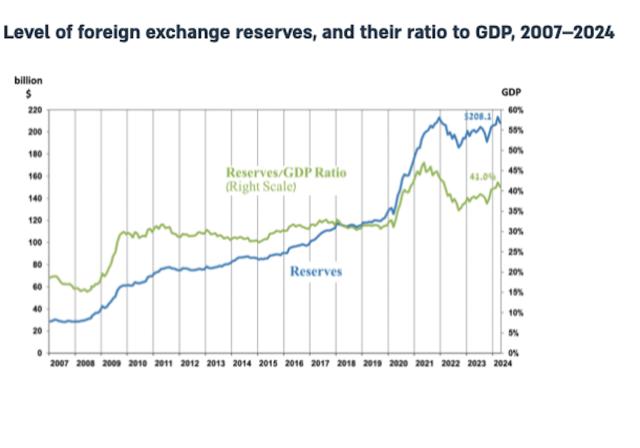Israel's foreign exchange reserves have witnessed a dramatic plunge, dropping by a staggering $5.632 billion in just one month, according to the latest figures released by the Bank of Israel. As of the end of April 2024, the reserves stood precariously at $208.109 billion, a significant decline from the previous month. This decline in reserves is a stark indicator of the financial turbulence faced by the nation, with the reserves relative to GDP now hanging at a mere 41%.
The sharp decrease in reserves can be largely attributed to a harsh revaluation which slashed the reserves by $3.895 billion, compounded by the government’s extensive foreign exchange activities which accounted for an additional $1.703 billion. Amidst ongoing geopolitical tensions, the Bank of Israel had previously announced a bold strategy during the war's onset in October 2023, planning to inject up to $30 billion to bolster the shekel. However, this plan has largely been unexecuted, with no foreign currency sold in February and a total of just $8.5 billion utilized since the war began—most of which was expended back in October. Despite these challenges, the foreign exchange reserves have somehow managed to climb from $201.895 billion to $208.109 billion over the past tumultuous 12 months.
Israel's forex reserves fell sharply in April https://t.co/J0IV5J0eHy
— Globes Business (@globesbiz) May 7, 2024
On the economic front, the OECD’s latest global economy report presents a mixed forecast for Israel. It anticipates a modest growth of 1.9% in 2024, which starkly contrasts with the 3.3% growth predicted before the war erupted. However, a more optimistic growth of 4.6% is expected in 2025. These projections are a blend of optimism and caution, with the OECD's figures slightly trailing behind the Bank of Israel's predictions but surpassing those of the IMF.
The report paints a grim picture of the Israeli construction industry, which has been severely impacted by the ongoing war. The lack of foreign workers has led to a catastrophic 53% reduction in new housing projects in the last quarter of 2023, with only a feeble recovery anticipated for 2024. Furthermore, inflation, which had previously soared to 5.4% in January 2023, is now expected to stabilize at 2.5% in 2024, slightly below the Bank of Israel’s forecast.
.@NirBarkat files complaint with @oecd against Turkish boycott https://t.co/IBtBjuNLv0
— (((IsraelMatzav))) (@IsraelMatzav) May 4, 2024
In fiscal terms, the OECD report offers a glimmer of hope, commending the decision to increase VAT to 18% in 2025. It notes that, beyond the immediate costs of the war, defense expenditures are projected to swell permanently by at least 0.5% of GDP. The report is optimistic that Israel will hit its target of a 6.6% government budget deficit, while also urging significant reforms to boost GDP growth. It warns against budget cuts in critical areas such as education, which are vital for sustaining the nation’s demographic growth and the burgeoning tech sector.


